2017 年浙江宁波大学基础英语考研真题
I. Vocabulary (30 points)
This part consists of two sections.
Section A
Directions: Choose one of the four alternatives which is closest in meaning to the
underlined word or phrase and mark the corresponding letter. Please write your
answers on the Answer Sheet.(1×20 points).
1. He avowed his commitment to those ideals.
A. acknowledged B. converted C. conformed D. renounced
2. The political dissident was accused of instigating a plot to overthrow the
government.
A. devising B. supporting C. funding D. provoking
3. I wish you two would stop bickering.
A. complaining B quarreling C. bargaining D murmuring
4. The defendant is facing severe verdict despite the appeal for clemency by his
lawyer.
A. forgiving B. release C. leniency D. impartiality
5. The little boy listened, enthralled by the Captain’s story.
A. fascinated B. swindled C. shocked D. bored
6. I was impressed by his expertise on landing craft.
A. encouragement B. special skill C. shrewdness D. eloquence
7. Your action is a breach of our university regulations.
A. observation B. violation C. creation D. attack
8. Subsequent events vindicated his policy.
A. predicate B. swing C. dilate D. verify
9. Drug smuggling carries a mandatory death penalty in most countries in the world.
A. impulsive B. multicolored C. obligatory D. laughable
10. Morality, for him, was doing what is expedient.
A. undesirable B. unavailable C advantageous D. inappropriate
11. “The giant was big” is a tautological statement, to say the least.
A . tight B. redundant C. illogical D. relative
12. There is an embargo on any more video games coming into the custom house.
A. landing place B. prohibition C. violation D. permission
13. Youngsters are usually more impetuous than old people.
A. impatient B. immature C. impulsive D. imperial
14. Unfortunately, I’ll spend the weekend doing a bunch of prosaic chores.
A. dull B. practical C. trivial D. rhyming
15. The crowd at the town meeting found the mayor’s assurance too glib.
A. sarcastic B. flashy C. malicious D. readily fluent
16. Gazing at the crystalline lake, I decided it was too beautiful to swim in.
A. breakable B. futuristic C. delicate D. sparkling
17. We cannot vacillate on the question of the party’s leadership.
A. lead B. doubt C. check D. repeat
�
18. It is more difficult for a chronic smoker to give up the habit than for a novice,
but it can be done.
A. constant B. wavering C. disciplined D. indecisive
19. They were furious when one of their best managers was poached by another company
A. headhunted B. punched C. plundered D. probed
20. The ink had faded with time and so parts of the letter were unreadable.
A. indelible B. inscrutable C. illegible D. illegitimate
Section B
There are ten words or phrases underlined in the following sentences. You are
required to use other English words or phrases to explain them with the meanings
that best suit those sentences (1×10 points).
For example: Johnny Carson has much to do to keep up with my great eloquence. Answer:
quick and witty tongue.
1. He was a fool to chuck himself away on such a frivolous woman.
2. Yet many Japanese seem more at ease with the idea of stately decline and genteel
isolation.
3. I think I can coax father into increasing my pocket money.
4. She grinned derisively while I seethed with rage.
5. Now I determined to step in myself and to allay her scruples with a portion of
the truth.
6. Her comeliness overwhelmed him.
7. We respectfully solicit your continuous friendship and patronage.
8. The statue has a gentleness, an ambience, a wistful elegance.
9. There is a pernicious culture of excellence: everything has to be not merely good
but the best. 10. Many values taught by religion are reinforced by society through
more secular systems.
II. Cloze (20 points)
Directions: There are twenty blanks in the following passage. You are required to
fill the words or phrases in them that best complete the passage to make a smooth
and logical reading semantically, syntactically and textually. The words that you
use to fill in the blanks can be any that you think are suitable and able to make
the passage smooth in meaning and grammar. Please write your answers on the Answer
Sheet.
I find(1)________ wholesome to be alone the greater part of the time. To be in
(2)_________ , even with the best, is soon wearisome and dissipating. I(3)_________
to be alone. I never found the companion that was (4)_________ companionable as
solitude. We are for the most part (5) _______ lonely when we go abroad among men
than when we (6)_______ in our chambers. A man thinking or working is always (6)
________ , let him be where he will. Solitude is not measured (7)_________ the
miles of space that intervene (8)__________ a man and his fellows. The really
diligent (9) ________ in one of the crowded hives of Cambridge College is as (10)
__________as a derris in the desert. The farmer can work alone in the field or the
woods (11)_________ day, hoeing or chopping, and not feel lonesome, (12)________
he is employed; but when he comes home at night he(13)___________ sit down in a
�
room alone, at the mercy(14)________ his thoughts, but must be where he can "see
the folks," and recreate, and, as he thinks, remunerate himself(15)________ his
day's solitude; and hence he wonders(16)_________ the student can sit alone in
the house all night and most of the day without ennui and "the blues"; (17)_______
he does not realize that the student, (18) ________ in the house, is still at work
in his field, and chopping in his (19)_______ , as the farmer in his, and in turn
seeks the same recreation and society that the latter does, though it may be a (20)
__________condensed form of it. (from “Solitude ” by H. D. Thoreau)
III. Error Detection and Correction (20 points)
Directions: There are twenty errors in the following passage. You should detect and
correct all the errors. Please write your answers on the Answer Sheet.
IV. Reading Comprehension (30 points)
Directions: There are three sections in this item with a passage in each section.
Section A requires you to read a passage and provide a brief answer to each of the
given questions. Section B requires you to read and judge whether the relevant
statements are true or false. Section C requires you to read and then write a summary
of it. Remember to write your answers on the Answer Sheet.
Section A. (10 points)
By the mid-century there emerged a trend in writing that favored a new approach to
�
constructing the novel that abandoned many of the time-honored traditions of form.
Indeed, there has been debate about whether many of the works of the times should
rightly be considered novels at all. Although not all writers of the period pursued
experimental methods, two of them, William Burroughs and Henry Miller, served as
exemplary figures.
William Burroughs published journals depicting his travels through South America
and North Africa. He was heavily influenced by his encounter with foreign languages
and associations with strange customs. The impact of his experiences on his writing
led to a uniquely detached style. Often it is difficult to determine who is telling
the stories, or where the characters have come from. In his most celebrated work
Naked Lunch, Burroughs is said to have physically cut up the manuscript and pasted
it back together, to further disturb the conventional notion of narration. Although
these writing techniques did not boost initial sales of his works, American academia
accepts him as an important practitioner of literary theory.
Henry Miller wrote about his personal life in a depth that previous authors had
avoided. In order to better expose compulsive desires, he used very graphic language
to describe the details of his intimate relationships. His books Tropic of Capricorn
and Tropic of Cancer were banned in some states when they were first published.
Although there are disagreements about Miller's moral positions, he is acknowledged
as an important contributor to mid-twentieth century American fiction.
1. What is the main topic of this passage?
2. What did the passage preceding this one probably discuss?
3. What can we assume about Burroughs' earlier works?
4. What is the most difficult aspect of reading the book Naked Lunch?
5. What can we infer about the works of the two men?
Section B.( 10 points)
Shakespeare’s sonnets are very different from Shakespeare’s plays, but they do
contain dramatic elements and an overall sense of story. Each of the poems deals
with a highly personal theme, and each can be taken on its own or in relation to
the poems around it. The sonnets have the feel of autobiographical poems, but we
don’t know whether they deal with real events or not, because no one knows enough
about Shakespeare’s life to say whether or not they deal with real events and
feelings, so we tend to refer to the voice of the sonnets as “the speaker”—as
though he were a dramatic creation like Hamlet or King Lear.
There are certainly a number of intriguing continuities throughout the poems. The
first 126 of the sonnets seem to be addressed to an unnamed young nobleman, whom
the speaker loves very much; the rest of the poems (except for the last two, which
seem generally unconnected to the rest of the sequence) seem to be addressed to a
mysterious woman, whom the speaker loves, hates, and lusts for simultaneously. The
two addressees of the sonnets are usually referred to as the “young man” and the
“dark lady”; in summaries of individual poems, I have also called the young man
the “beloved” and the dark lady the “lover,” especially in cases where their
identity can only be surmised. Within the two mini-sequences, there are a number
of other discernible elements of “plot”: the speaker urges the young man to have
�
children; he is forced to endure a separation from him; he competes with a rival
poet for the young man’s patronage and affection. At two points in the sequence,
it seems that the young man and the dark lady are actually lovers themselves—a state
of affairs with which the speaker is none too happy. But while these continuities
give the poems a narrative flow and a helpful frame of reference, they have been
frustratingly hard for scholars and biographers to pin down. In Shakespeare’s life,
who were the young man and the dark lady?
Of all the questions surrounding Shakespeare’s life, the sonnets are perhaps the
most intriguing. At the time of their publication in 1609 (after having been written
most likely in the 1590s and shown only to a small circle of literary admirers),
they were dedicated to a “Mr. W.H,” who is described as the “onlie begetter”
of the poems. Like those of the young man and the dark lady, the identity of this
Mr. W.H. remains an alluring mystery. Because he is described as “begetting” the
sonnets, and because the young man seems to be the speaker’s financial patron, some
people have speculated that the young man is Mr. W.H. If his initials were reversed,
he might even be Henry Wriothesley, the Earl of Southampton, who has often been linked
to Shakespeare in theories of his history. But all of this is simply speculation:
ultimately, the circumstances surrounding the sonnets, their cast of characters and
their relations to Shakespeare himself, are destined to remain a mystery.
Decide whether the following statements are true (T) or false (F).
1. According to this passage, Shakespeare’s sonnets might have contained a
continuity of love story.
2. The speaker of Shakespeare’s sonnets is perfectly happy with both the young noble
man and the “dark lady”, according to the passage.
3. Shakespeare’s sonnets were dedicated to a “W.H.”, who must be Henry Wriothesley,
the Earl of Southampton.
4. It could be inferred from the passage that most life stories about Shakespeare
are conjectures. 5. Shakespeare wrote 153 sonnets, all of which have the feel of
autobiographical poems.
Section C ( 10 points)
Read the following passage and write a summary of it within 200 words.
Knowing that Mrs. Mallard was afflicted with a heart trouble, great care was taken
to break to her as gently as possible the news of her husband's death.
It was her sister Josephine who told her, in broken sentences; veiled hints that
revealed in half concealing. Her husband's friend Richards was there, too, near her.
It was he who had been in the newspaper office when intelligence of the railroad
disaster was received, with Brently Mallard's name leading the list of "killed."
He had only taken the time to assure himself of its truth by a second telegram, and
had hastened to forestall any less careful, less tender friend in bearing the sad
message.
She did not hear the story as many women have heard the same, with a paralyzed
inability to accept its significance. She wept at once, with sudden, wild abandonment,
in her sister's arms. When the storm of grief had spent itself she went away to her
room alone. She would have no one follow her.
�
There stood, facing the open window, a comfortable, roomy armchair. Into this she
sank, pressed down by a physical exhaustion that haunted her body and seemed to reach
into her soul. She could see in the open square before her house the tops of trees
that were all aquiver with the new spring life. The delicious breath of rain was
in the air. In the street below a peddler was crying his wares. The notes of a distant
song which someone was singing reached her faintly, and countless sparrows were
twittering in the eaves.
There were patches of blue sky showing here and there through the clouds that had
met and piled one above the other in the west facing her window.
She sat with her head thrown back upon the cushion of the chair, quite motionless,
except when a sob came up into her throat and shook her, as a child who has cried
itself to sleep continues to sob in its dreams.
She was young, with a fair, calm face, whose lines bespoke repression and even a
certain strength. But now there was a dull stare in her eyes, whose gaze was fixed
away off yonder on one of those patches of blue sky. It was not a glance of reflection,
but rather indicated a suspension of intelligent thought.
There was something coming to her and she was waiting for it, fearfully. What was
it? She did not know; it was too subtle and elusive to name. But she felt it, creeping
out of the sky, reaching toward her through the sounds, the scents, the color that
filled the air.
Now her bosom rose and fell tumultuously. She was beginning to recognize this thing
that was approaching to possess her, and she was striving to beat it back with her
will--as powerless as her two white slender hands would have been. When she abandoned
herself a little whispered word escaped her slightly parted lips. She said it over
and over under the breath: "free, free, free!" The vacant stare and the look of terror
that had followed it went from her eyes. They stayed keen and bright. Her pulses
beat fast, and the coursing blood warmed and relaxed every inch of her body. She
did not stop to ask if it were or were not a monstrous joy that held her. A clear
and exalted perception enabled her to dismiss the suggestion as trivial. She knew
that she would weep again when she saw the kind, tender hands folded in death; the
face that had never looked save with love upon her, fixed and gray and dead. But
she saw beyond that bitter moment a long procession of years to come that would belong
to her absolutely. And she opened and spread her arms out to them in welcome.
There would be no one to live for during those coming years; she would live for herself.
There would be no powerful will bending hers in that blind persistence with which
men and women believe they have a right to impose a private will upon a
fellow-creature. A kind intention or a cruel intention made the act seem no less
a crime as she looked upon it in that brief moment of illumination.
And yet she had loved him--sometimes. Often she had not. What did it matter! What
could love, the unsolved mystery, count for in the face of this possession of
self-assertion which she suddenly recognized as the strongest impulse of her being!
"Free! Body and soul free!" she kept whispering.
Josephine was kneeling before the closed door with her lips to the keyhole, imploring
for admission. "Louise, open the door! I beg; open the door--you will make yourself
�
ill. What are you doing, Louise? For heaven's sake open the door."
"Go away. I am not making myself ill." No; she was drinking in a very elixir of life
through that open window.
Her fancy was running riot along those days ahead of her. Spring days, and summer
days, and all sorts of days that would be her own. She breathed a quick prayer that
life might be long. It was only yesterday she had thought with a shudder that life
might be long.
She arose at length and opened the door to her sister's importunities. There was
a feverish triumph in her eyes, and she carried herself unwittingly like a goddess
of Victory. She clasped her sister's waist, and together they descended the stairs.
Richards stood waiting for them at the bottom.
Someone was opening the front door with a latchkey. It was Brently Mallard who entered,
a little travel-stained, composedly carrying his grip-sack and umbrella. He had been
far from the scene of the accident, and did not even know there had been one. He
stood amazed at Josephine's piercing cry; at Richards' quick motion to screen him
from the view of his wife.
When the doctors came they said she had died of heart disease----of the joy that
kills. ( ---------“ The Story of an Hour ” by Kate Chopin )
Summary ( Please write it on the Answer sheet )
V.Writing (50 points)
Directions: In her concession speech, Hillary Clinton has called on her supporters
to give Republican president-elect Donald Trump “the chance to lead”, saying that
her loss was “ painful,and it will be for a long time.” Addressing young people
who had worked for and supported her campaign, Ms Clinton reflected on how in her
life she had had successes and setbacks, “sometimes really painful ones”, and so
would they. But she implored them not to despair: “This loss hurts. But please,
please never stop believing that fighting for what’s right is worth it. It’s always
worth it.” Write an essay entitled “ Losses and Successes in my Life
Experience ”in no less than 400 words to demonstrate your opinions on the values
of losses. Remember to write your essay on the Answer Sheet.
Losses and Successes in my Life Experience
�
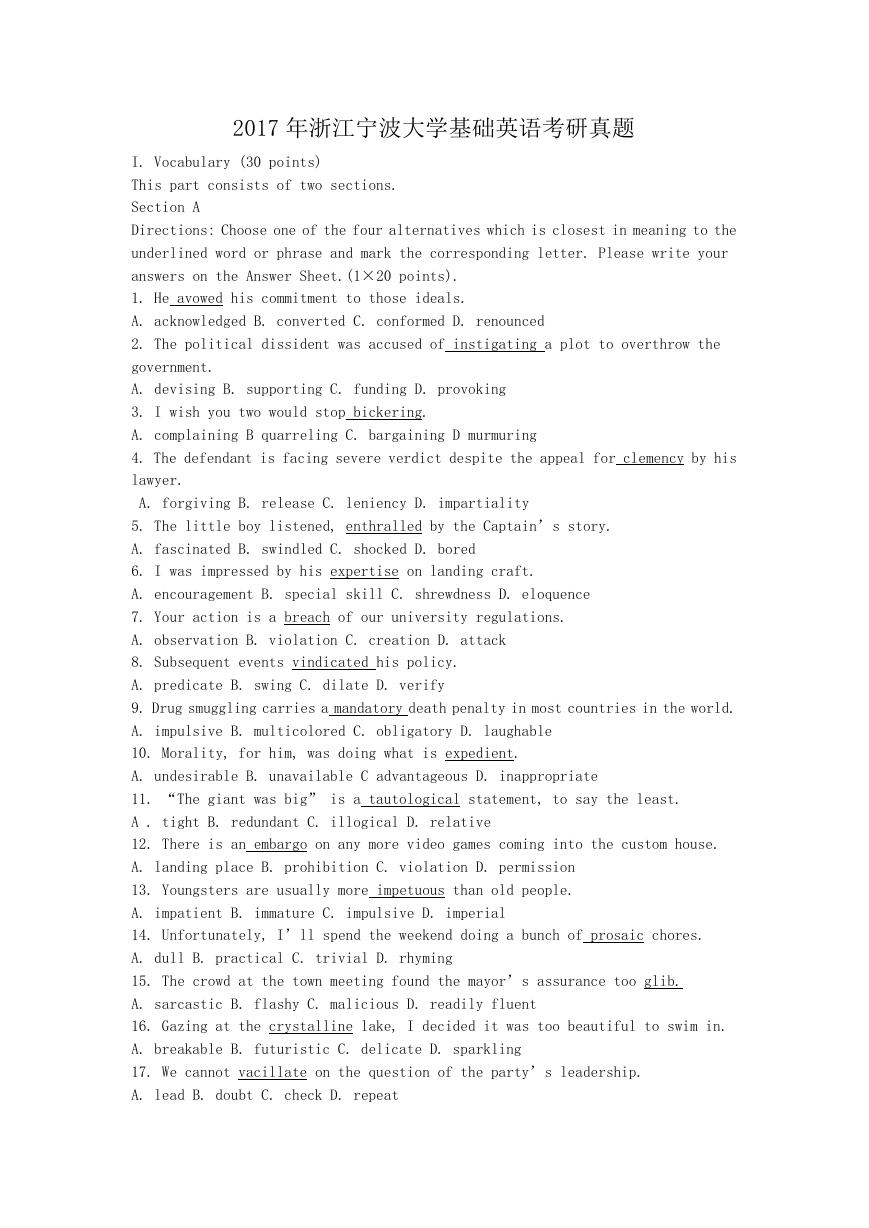
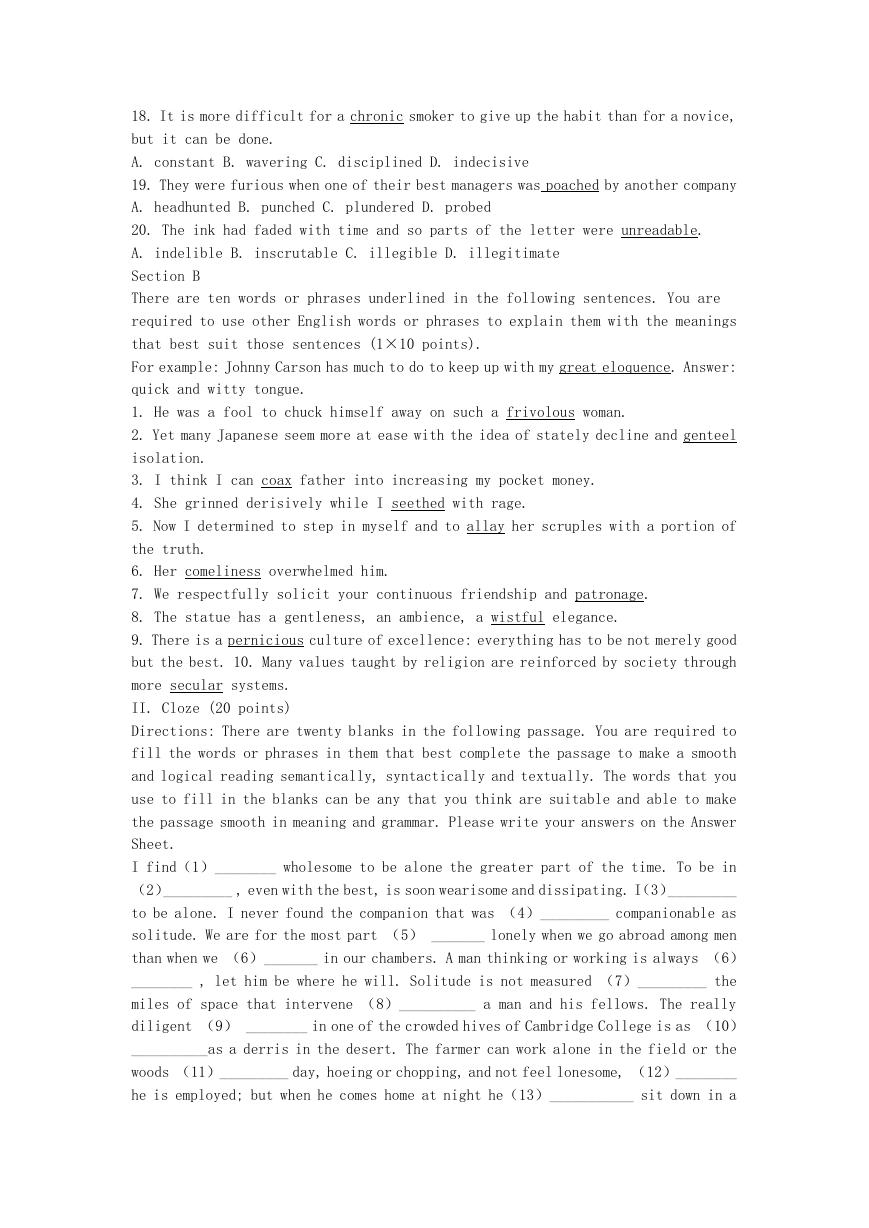
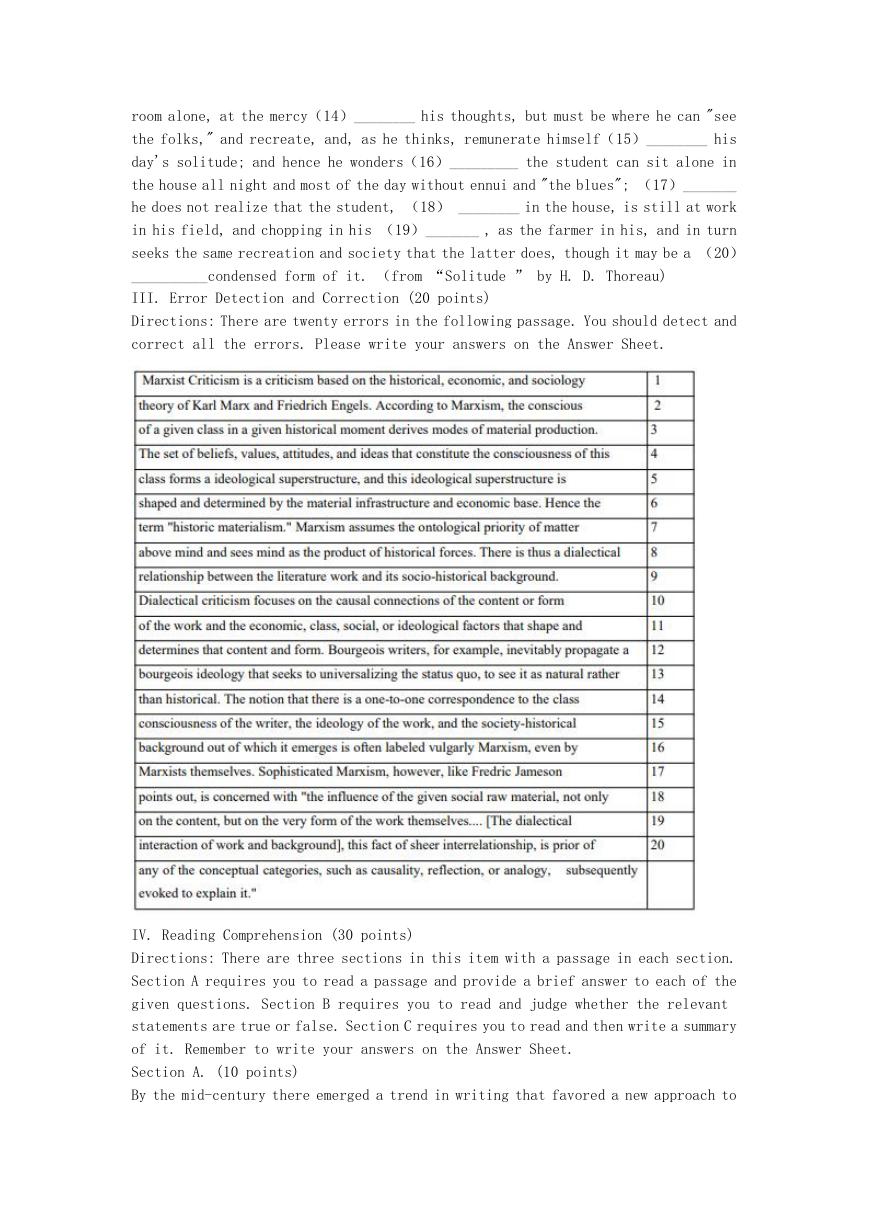
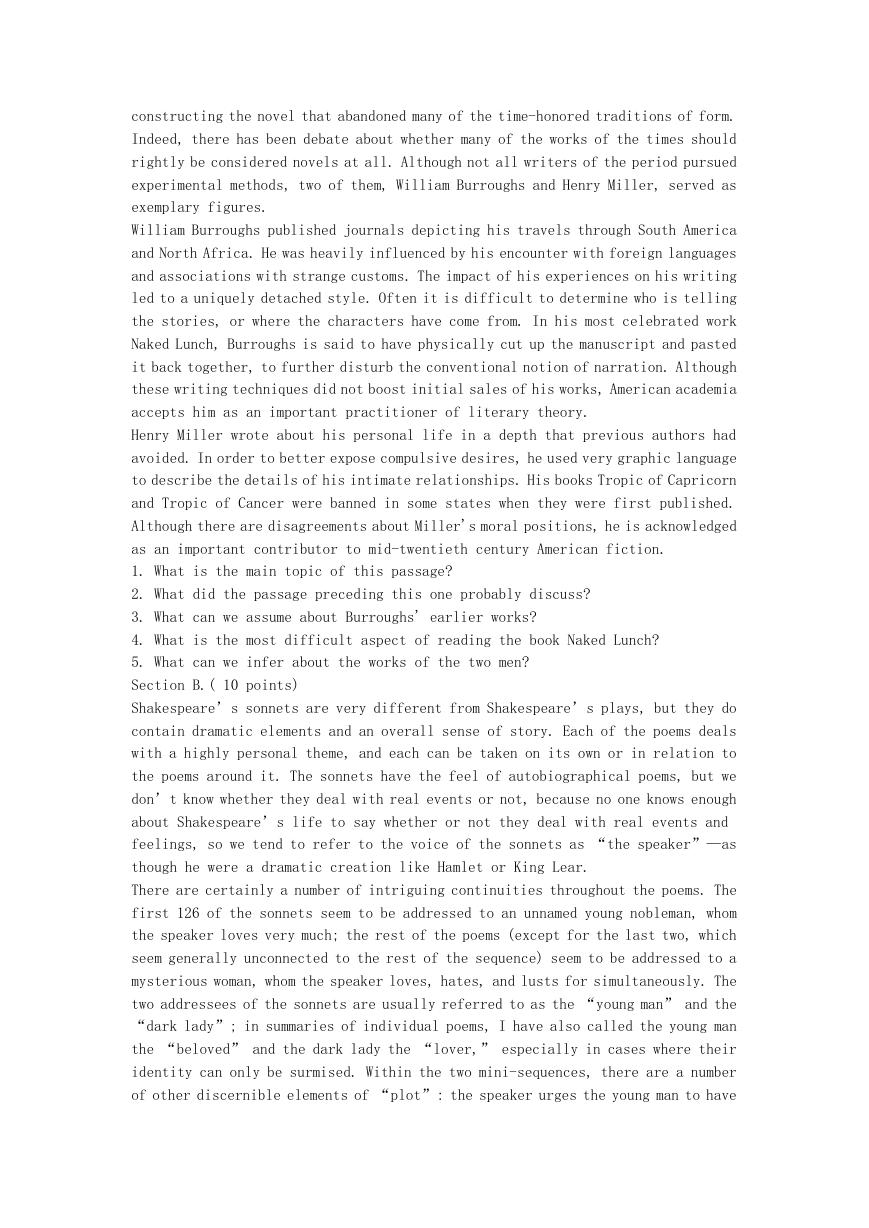
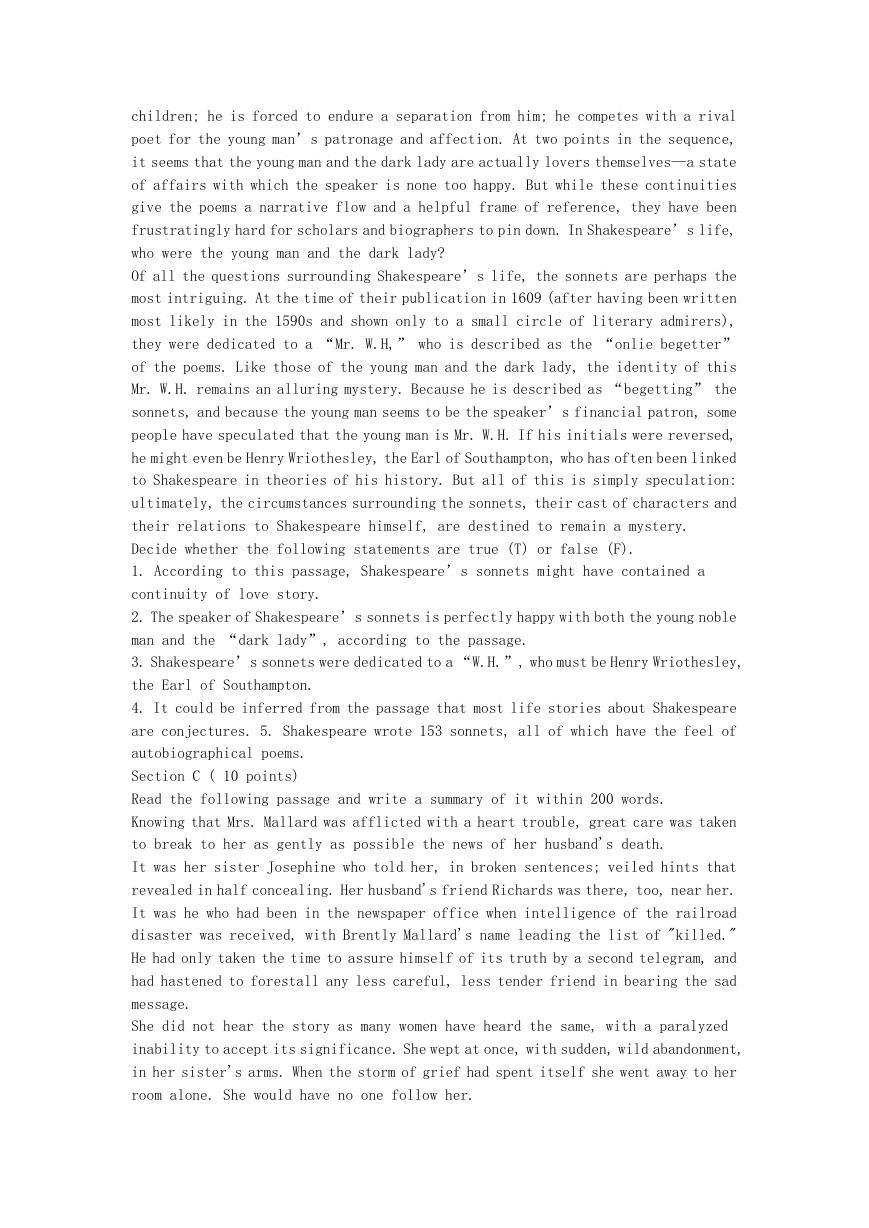
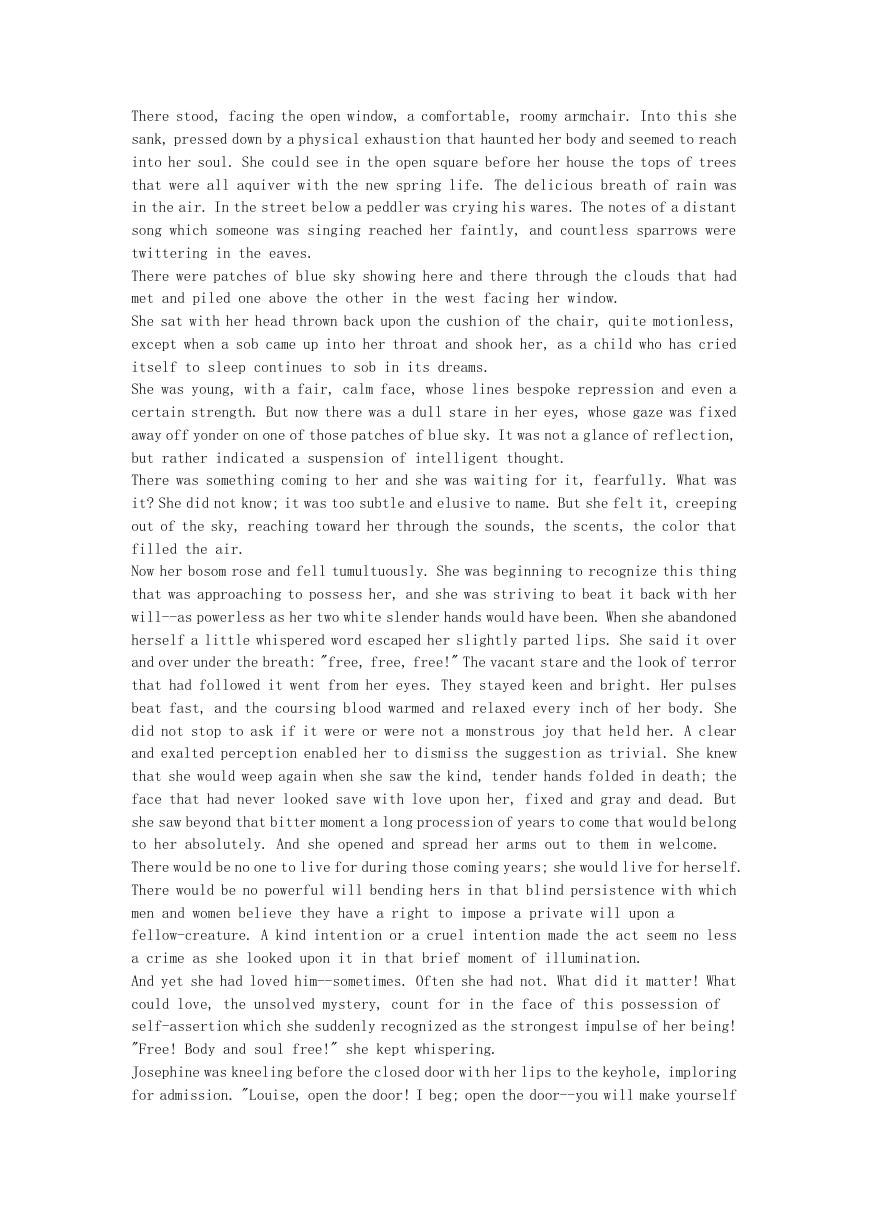
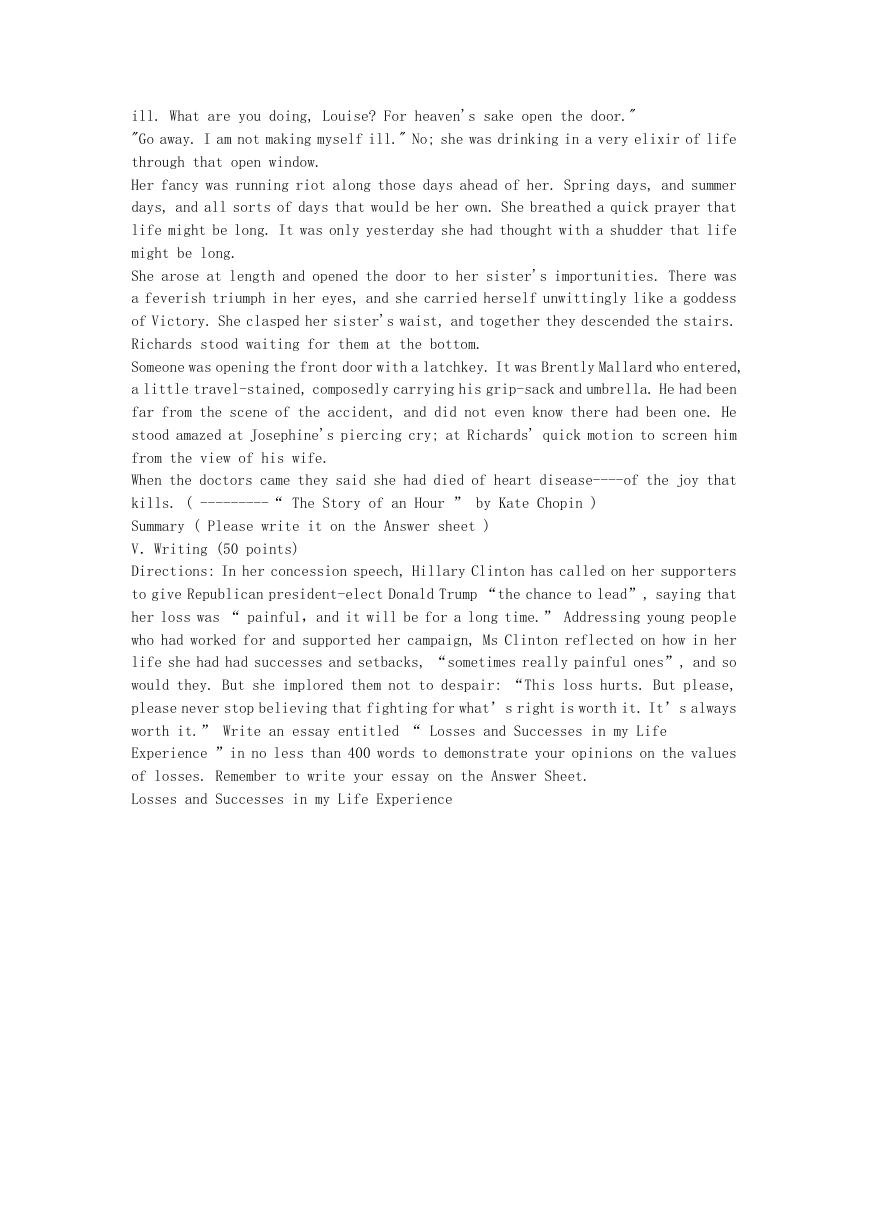







 2023年江西萍乡中考道德与法治真题及答案.doc
2023年江西萍乡中考道德与法治真题及答案.doc 2012年重庆南川中考生物真题及答案.doc
2012年重庆南川中考生物真题及答案.doc 2013年江西师范大学地理学综合及文艺理论基础考研真题.doc
2013年江西师范大学地理学综合及文艺理论基础考研真题.doc 2020年四川甘孜小升初语文真题及答案I卷.doc
2020年四川甘孜小升初语文真题及答案I卷.doc 2020年注册岩土工程师专业基础考试真题及答案.doc
2020年注册岩土工程师专业基础考试真题及答案.doc 2023-2024学年福建省厦门市九年级上学期数学月考试题及答案.doc
2023-2024学年福建省厦门市九年级上学期数学月考试题及答案.doc 2021-2022学年辽宁省沈阳市大东区九年级上学期语文期末试题及答案.doc
2021-2022学年辽宁省沈阳市大东区九年级上学期语文期末试题及答案.doc 2022-2023学年北京东城区初三第一学期物理期末试卷及答案.doc
2022-2023学年北京东城区初三第一学期物理期末试卷及答案.doc 2018上半年江西教师资格初中地理学科知识与教学能力真题及答案.doc
2018上半年江西教师资格初中地理学科知识与教学能力真题及答案.doc 2012年河北国家公务员申论考试真题及答案-省级.doc
2012年河北国家公务员申论考试真题及答案-省级.doc 2020-2021学年江苏省扬州市江都区邵樊片九年级上学期数学第一次质量检测试题及答案.doc
2020-2021学年江苏省扬州市江都区邵樊片九年级上学期数学第一次质量检测试题及答案.doc 2022下半年黑龙江教师资格证中学综合素质真题及答案.doc
2022下半年黑龙江教师资格证中学综合素质真题及答案.doc